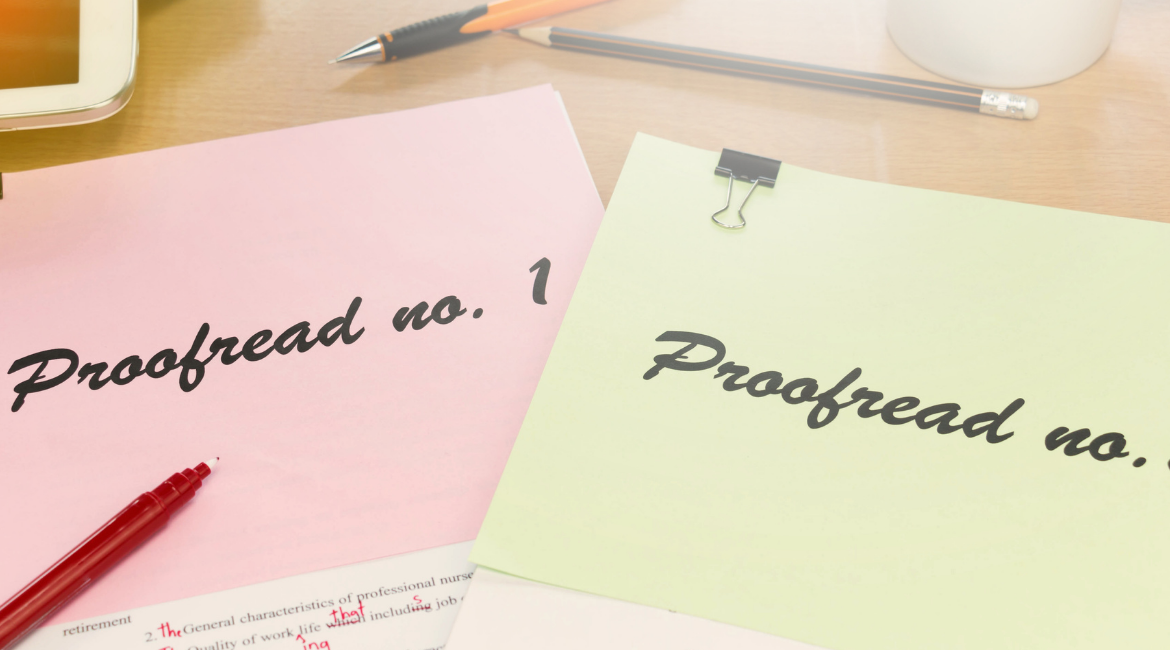
Everybody knows proofreading your own work can be difficult. It’s as though the brain knows what you think you wrote and automatically corrects any error. You’re blind to your own mistakes. So, if you can afford it, most people would recommend getting a professional to proofread your work. But let’s face it. Some of us can’t afford one. Not being able to afford a proofreader is not a reason to send out sloppy work. So, let’s go through some quick and easy tips to get your work into a better version of itself.
- Watch out for homonyms and contractions: Do you mean compliment or complement? Do you mean its or it’s? It’s easy to trip up on these ones, so pay attention. If in doubt look it up.Read aloud. I am sure you’ve heard this one. It’s a pretty common tip, but it really works. It makes you slow down. Besides, the ear has a way of picking errors that our eyes missed.
- Proofread your documents in a format different from the one in which you wrote them. So, if your work was in Word, put it in PDF. Or you can try putting it in two columns.
Another thing you can do is to put it on a different device. If you originally created a document on your laptop or on your computer, you could put it into your phone and try reading it there.
When you do that, it helps to defamiliarize the document. What happens when you’ve been working on a piece of writing is that you get used to it. So when you’re reading it, you autocorrect. Your brain automatically corrects without picking out the errors. But if you put it in a different format, it creates an illusion that your document is new. That way you’re able to pick up mistakes that you did not see before.
You can also print it out and proofread a hard copy. I especially like this tip.

- Try reading the documents backward. Read one sentence at a time backward. I first learned this trick on grammar girl’s video, and it was mind-blowing. When you are reading backward, it slows you down. You’re reading out of context, and so you are more focused on the words that are being used and not following the story you’re writing or following the essay you’re writing. Instead, you’re concentrating on the words at the sentence level. It helps you to pick out errors. It really does.
- Have the computer read out to you. This is like reading out loud, but it’s not quite like it. Sometimes when I’m reading out loud, I get tired. I start rushing and missing the errors. But if the computer is reading, you are focused on listening rather than speaking. That way, you’re able to pick out more mistakes. Watch out so you don’t get distracted and stop listening.
- Use your dictionary: I don’t know about you, but sometimes I’m confused about whether or not to use hyphen. I get confused about the spelling of some words too. Especially with UK versus US English. Having a dictionary handy or going online to crosscheck really is a great practice. If you’re unsure whether to use a hyphen or not, look it up your dictionary. Does a word look wrong? Use your dictionary.
- Have a checklist: If you are working with a style guide, this is important. Try to create your own list, which should include common mistakes you make. One thing I have on my list is to check my references. I don’t know why, but it’s such a big problem for me. When I worked on my dissertation, my reference section was littered with mistakes. Thank God my supervisor noticed them.
What’s an error you commonly make?
- Give it some time: When you take some time off from your work, it rests the brain. When you return to work, you are coming back with fresh eyes and fresh brain. It helps pick you proofread more effectively. It’s another defamiliarizing technique.
- Use tools and apps like spell checkers and grammar checkers. But be careful with this tip. Crosscheck every suggestion before accepting.
- Have a friend read it: This is a tip I regularly used when I worked on my dissertation. I had friends read my work and I read theirs too. This is especially helpful in ensuring clarity in your writing. Sometimes, my readers would come back and say- I didn’t quite get what you were saying here.
So, there you have it. Quick tips to help you proofread your work when you are on a budget.

